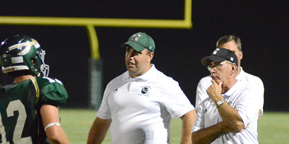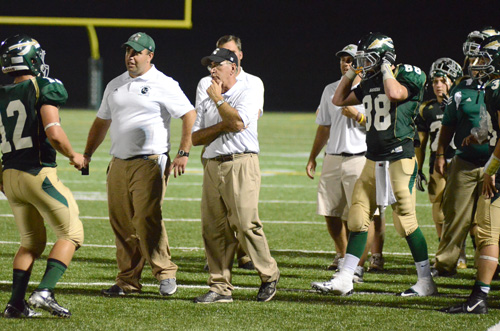

Courtesy Michael Wyand
By Jordana Bieze Foster
With the Nashoba Regional football team looking to defend its back-to-back Super Bowl titles and extend its 26-game winning streak, new head coach Jamie Tucker has plenty of reasons to be focusing on Xs and Os during this preseason. But Tucker is also focusing on keeping his players safe.
On August 10, Tucker attended a “Practice Like Pros” seminar in Worcester, where speakers including Dartmouth College coach Buddy Teevens and well-known sports neurologist Dr. Robert Cantu discussed the risk of concussion during high school football practices and how coaches can help minimize that risk.
Tucker was not required, or even encouraged, to attend the seminar. He just thought it made sense.
“At Nashoba, we’ve always said to our kids the goal is to make it to the game,” said Tucker, who spent four of the last five seasons as a Chieftains assistant under his father, longtime head coach Ken Tucker. “The goal isn’t to have five contact practices during the week and then play a game. What sense does it make to have a kid get hurt on Wednesday? You don’t need to lose a kid during the week. It’s unnecessary.”
Although there has been a nationwide push in the last several years to limit the number of contact practices allowed in high school football, many coaches have expressed concern that without contact, players can’t learn proper tackling technique and therefore the risks of injury will actually increase. But Tucker said after seeing video of Teevens’ players doing noncontact tackling drills, he was reassured that the safer approach actually can improve players’ skills as well.
“It’s just going back to the fundamentals of tackling, like practicing a jump shot,” he said. “The year that Dartmouth went to limited-contact practice, they actually got better at tackling. They had 50% fewer missed tackles – that’s a huge number. So it’s definitely something I’m going to instill.”
Nashoba Regional athletic director Tania Rich, who hired Tucker in May after interviewing at least a dozen other candidates for the head coaching position, said she was very impressed that he took the initiative to attend the concussion seminar – but not necessarily surprised.
“Jamie is passionate about the game and is willing to learn everything he can to help him as a coach and the program in general,” Rich said. “Jamie is committed and dedicated to Nashoba, and his attending this seminar is just one example of his commitment to the program.”
Certainly Ken Tucker is a tough act to follow, and Jamie Tucker acknowledges that given the team’s recent run of success, there’s no need to rewrite the playbook. But he is looking forward to putting his own stamp on this year’s team.
“I look at it as an opportunity,” said Jamie Tucker, who graduated from Nashoba in 2002. “Everyone knows we’ve won 26 games in a row, it’s out there, but as I’ve stressed to the team and coaches, this is a separate team. Of course we want to keep the traditions going, and I don’t want to take away from that. But this team is different, and in reality the number 26 doesn’t matter. It’s a new season, so you have to start from scratch. If we were 5-6 last year I’d be saying the same thing. Right now we’re 0-0. Let’s work from there.”
The coaching staff, like the roster, will have some new faces along with some that are familiar. Assistants Casey Ruggiero, Phil Sipowicz, Bob Raymond, and Mike Gilchrest are returning from last season’s staff, and Steve Trundle will also return as an assistant after several years as head coach of the Brookline High School varsity ice hockey team. The other new assistants also have Nashoba ties: Pete Connery is the head coach of the Chieftain wrestling team, and Garrett Jones is a former star quarterback for the Chieftains who graduated in 2005.
Ruggiero will be the defensive coordinator. Tucker, who played quarterback while at Nashoba and at Assumption College, will call the offensive plays himself.
But Tucker, who also spent a year as quarterbacks coach at Assumption, doesn’t consider his offensive prowess to necessarily be his greatest asset as a coach.
“My biggest thing is that I really value developing relationships with kids,” he said. “That way if a difficult situation does arise, you can work with it. It makes everything so much easier. I think that’s one of my biggest strengths.”